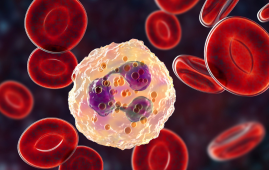

The body’s immune system and the brain are in constant communication. This kind of communication seems to be intended to maintain a fine balance between protecting healthy tissue and preventing harm and infection.
Researchers at St. Louis’s Washington University School of Medicine have now shown how the two coexist in harmony. According to the study, the brain and spinal cord of the central nervous system in mice manufacture pieces of immune-stimulating proteins called guardian peptides to preserve the immunological balance of the brain and allow for a normal exchange of information with the immune system.This offers fresh perspectives on pertinent exposure periods that are essential for the onset of ischemic heart disease.
The discovery, which was published on October 30 in the journal Nature, may help treat conditions including Alzheimer’s disease and multiple sclerosis (MS), among others.
“We have found guardian brain peptides that actively engage with the immune system to keep it in check, possibly preventing destructive immune responses,” said Jonathan Kipnis, PhD, the Alan A. and Edith L. Wolff Distinguished Professor of Pathology & Immunology and a BJC Investigator at WashU Medicine.
We think such peptides help the immune system to maintain a state of ‘immune privilege.’ We are intrigued by the possibility of developing such proteins from healthy brains into a therapy to suppress inappropriate immune responses and develop better disease-modifying therapies for neuroinflammatory diseases.”
Jonathan Kipnis, PhD, the Alan A. and Edith L. Wolff Distinguished Professor of Pathology & Immunology, Washington University School of Medicine
T Cells and the Brain’s Immune System
A subpopulation of T cells involved in immune surveillance are capable of triggering an immunological response in response to a danger. This warning appears on the surface of another set of presenting immune cells as a little protein fragment, which is a sample of the possible danger. T cells launch an attack if they believe the protein fragment poses a threat.
At the interface of the brain’s borders, the researchers discovered that immune cells presented guardian peptides. These peptides attracted and activated a subgroup of immune T cells, which have a regulatory function and suppress aberrant immune responses.
Potential for Diagnosing and Treating Neuroinflammatory Diseases
Min Woo Kim, a researcher in the Kipnis lab and a graduate student in WashU Medicine’s Medical Scientist Training Program, studied presenting immune cells from the brain and related immunological organs in healthy mice. He discovered that these cells had a wide variety of brain proteins, the most prominent of which was a part of the myelin sheath, the protective covering that MS damages on neurons.
The scientists discovered that these proteins were significantly reduced in MS mice. The researchers discovered that the treatment increased and activated a subgroup of suppressor T cells by injecting vesicles, which are membrane-bound compartments, into the cerebrospinal fluid of MS-affected mice to replace the missing brain-derived peptides. When compared to animals who got control vesicles, the treated mice’s motor function improved and the disease’s progression delayed.
“We have identified a novel process in the brain where the organ actively engages with the immune system to present a healthy image of itself,” Kim said. “That image looks different in mice with multiple sclerosis. We think that other neuroinflammatory and even neurodegenerative diseases may have unique protein signatures presented to the immune system, opening the exciting possibility of using such signatures as a diagnostic tool for early diagnosis.”
For more information: Kim, M. W., et al. (2024). Endogenous self-peptides guard immune privilege of the central nervous system. Nature. doi.org/10.1038/s41586-024-08279-y
more recommended stories
 Silica Nanomatrix Boosts Dendritic Cell Cancer Therapy
Silica Nanomatrix Boosts Dendritic Cell Cancer TherapyKey Points Summary Researchers developed a.
 Vagus Nerve and Cardiac Aging: New Heart Study
Vagus Nerve and Cardiac Aging: New Heart StudyKey Takeaways for Healthcare Professionals Preserving.
 Cognitive Distraction From Conversation While Driving
Cognitive Distraction From Conversation While DrivingKey Takeaways (Quick Summary) Talking, not.
 Fat-Regulating Enzyme Offers New Target for Obesity
Fat-Regulating Enzyme Offers New Target for ObesityKey Highlights (Quick Summary) Researchers identified.
 Spatial Computing Explains How Brain Organizes Cognition
Spatial Computing Explains How Brain Organizes CognitionKey Takeaways (Quick Summary) MIT researchers.
 Gestational Diabetes Risk Identified by Blood Metabolites
Gestational Diabetes Risk Identified by Blood MetabolitesKey Takeaways (Quick Summary for Clinicians).
 Phage Therapy Study Reveals RNA-Based Infection Control
Phage Therapy Study Reveals RNA-Based Infection ControlKey Takeaways (Quick Summary) Researchers uncovered.
 Pelvic Floor Disorders: Treatable Yet Often Ignored
Pelvic Floor Disorders: Treatable Yet Often IgnoredKey Takeaways (Quick Summary) Pelvic floor.
 Urine-Based microRNA Aging Clock Predicts Biological Age
Urine-Based microRNA Aging Clock Predicts Biological AgeKey Takeaways (Quick Summary) Researchers developed.
 Circadian Control of Neutrophils in Myocardial Infarction
Circadian Control of Neutrophils in Myocardial InfarctionKey Takeaways for HCPs Neutrophil activity.

Leave a Comment